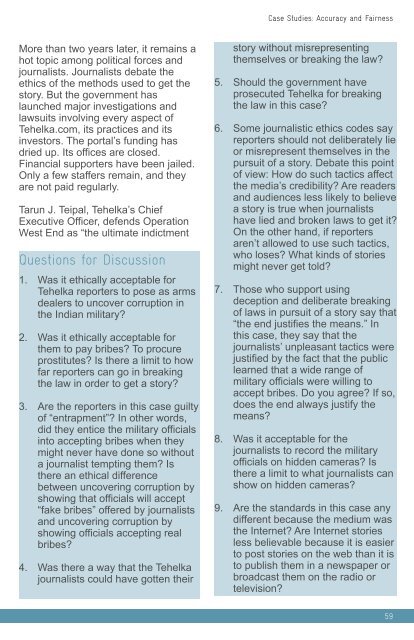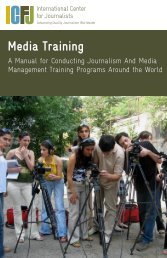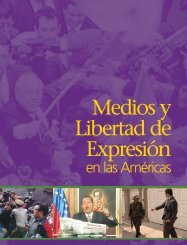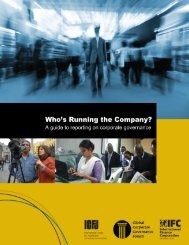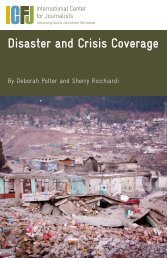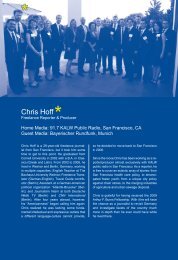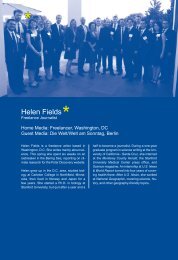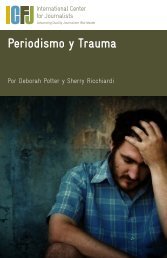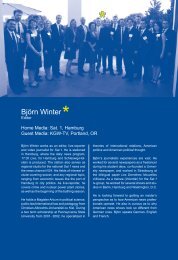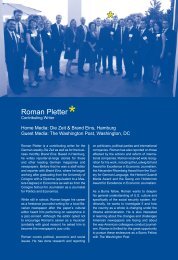Download PDF - International Center for Journalists
Download PDF - International Center for Journalists
Download PDF - International Center for Journalists
Create successful ePaper yourself
Turn your PDF publications into a flip-book with our unique Google optimized e-Paper software.
Case Studies: Accuracy and Fairness<br />
More than two years later, it remains a<br />
hot topic among political <strong>for</strong>ces and<br />
journalists. <strong>Journalists</strong> debate the<br />
ethics of the methods used to get the<br />
story. But the government has<br />
launched major investigations and<br />
lawsuits involving every aspect of<br />
Tehelka.com, its practices and its<br />
investors. The portal’s funding has<br />
dried up. Its offices are closed.<br />
Financial supporters have been jailed.<br />
Only a few staffers remain, and they<br />
are not paid regularly.<br />
Tarun J. Teipal, Tehelka’s Chief<br />
Executive Officer, defends Operation<br />
West End as “the ultimate indictment<br />
Questions <strong>for</strong> Discussion<br />
1. Was it ethically acceptable <strong>for</strong><br />
Tehelka reporters to pose as arms<br />
dealers to uncover corruption in<br />
the Indian military?<br />
2. Was it ethically acceptable <strong>for</strong><br />
them to pay bribes? To procure<br />
prostitutes? Is there a limit to how<br />
far reporters can go in breaking<br />
the law in order to get a story?<br />
3. Are the reporters in this case guilty<br />
of “entrapment”? In other words,<br />
did they entice the military officials<br />
into accepting bribes when they<br />
might never have done so without<br />
a journalist tempting them? Is<br />
there an ethical difference<br />
between uncovering corruption by<br />
showing that officials will accept<br />
“fake bribes” offered by journalists<br />
and uncovering corruption by<br />
showing officials accepting real<br />
bribes?<br />
4. Was there a way that the Tehelka<br />
journalists could have gotten their<br />
story without misrepresenting<br />
themselves or breaking the law?<br />
5. Should the government have<br />
prosecuted Tehelka <strong>for</strong> breaking<br />
the law in this case?<br />
6. Some journalistic ethics codes say<br />
reporters should not deliberately lie<br />
or misrepresent themselves in the<br />
pursuit of a story. Debate this point<br />
of view: How do such tactics affect<br />
the media’s credibility? Are readers<br />
and audiences less likely to believe<br />
a story is true when journalists<br />
have lied and broken laws to get it?<br />
On the other hand, if reporters<br />
aren’t allowed to use such tactics,<br />
who loses? What kinds of stories<br />
might never get told?<br />
7. Those who support using<br />
deception and deliberate breaking<br />
of laws in pursuit of a story say that<br />
“the end justifies the means.” In<br />
this case, they say that the<br />
journalists’ unpleasant tactics were<br />
justified by the fact that the public<br />
learned that a wide range of<br />
military officials were willing to<br />
accept bribes. Do you agree? If so,<br />
does the end always justify the<br />
means?<br />
8. Was it acceptable <strong>for</strong> the<br />
journalists to record the military<br />
officials on hidden cameras? Is<br />
there a limit to what journalists can<br />
show on hidden cameras?<br />
9. Are the standards in this case any<br />
different because the medium was<br />
the Internet? Are Internet stories<br />
less believable because it is easier<br />
to post stories on the web than it is<br />
to publish them in a newspaper or<br />
broadcast them on the radio or<br />
television?<br />
59


